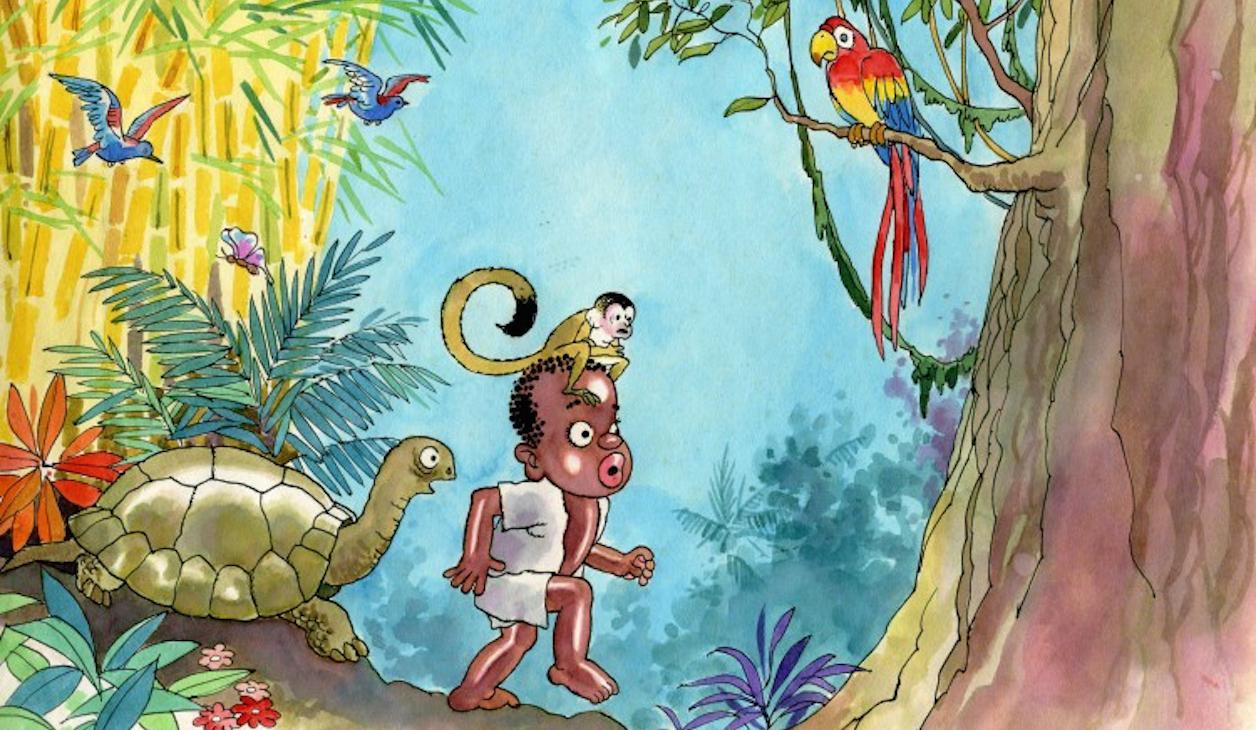Is this classic Costa Rican children’s book racist?
"Cocori" is required reading in Costa Rican schools, much to some Afro-Caribbean people's dismay. The original 1947 version had no illustrations like this one, which was added in later editions. (Image viaThe Tico Times)
LIMA, Peru — A fond account of the adventures of a black youngster, or a racist caricature of an entire culture?
That's the question at the heart of a debate raging in Costa Rica over the children’s book "Cocori," long regarded as a national literary classic.
Written in 1947, it tells the tale of Cocori, an Afro-Costa Rican boy who scours the jungle for a monkey to fulfill the request of a mysterious blonde girl.
It describes him as having the face of a star apple, a local fruit, teeth like a rattle and gums of papaya.
It also says the white girl has flesh like a pineapple and eyes like a slice of sky.
The book has long been compulsory reading in the Central American nation’s schools and has even given its name to various businesses, including the tourism website cocori.com.
But now it is coming under scrutiny as never before. Members of Costa Rica’s black community — about 8 percent of the 4.9 million population — increasingly view it as a skewed interpretation of their identity by its white author, Joaquin Gutierrez.
This is reminiscent of similar controversies around much-loved works — at least by white audiences — in other countries. Take America's "Little Black Sambo," which was eventually even banned — but only after decades of widespread popularity.
In April, Costa Rica’s only two black lawmakers launched a lawsuit to have Cocori removed from school reading lists. Their objections also led the government to briefly block a musical adaptation, funded with public money, until a court ruled the production could go ahead.
One of the legislators, Epsy Campbell, says her daughter was teased at school because of the book. “For the Afro-descendant culture and people, the only thing this book has done is reproduce some of the most primitive stereotypes,” she added in the speech posted to her Facebook account.
More from GlobalPost: How the Ebola outbreak turned into a racism and responsibility debate
She appears to have the backing of Costa Rica’s official human rights agency. It recently issued a statement about the controversy, reminding the government of its obligation to “guarantee all people the right to live in an environment free of discrimination and racism.”
But the moves have also caused consternation in Costa Rica, one of Latin America’s most peaceful and racially inclusive societies, where many regard Cocori as part of the national identity.
Some Costa Ricans have even accused the two representatives of stirring up problems where none existed.
This tweet, from a Costa Rican journalist and singer, says: “The first time I read Cocori, I imagined it so beautifully … I think it was Ms. Epsy who saw the ugly side of my black [boy].”
Yet for some the dispute about Cocori really reflects the shortcomings of Costa Rican society both today and when it was written — one year before Afro-Caribbeans were recognized as citizens of the country.
“The problem is not the book itself but the uses we give to this book,” says Rina Caceres, a history professor specializing in Afro-Caribbean culture at the University of Costa Rica. “You can see why it could cause the wrong reaction in a classroom of 10-year-olds.”
More from GlobalPost: The Netherlands has a holiday blackface problem (VIDEO)
For her, the real issue with the book is that its entire characterization of its protagonist revolves around his perceived racial features. It makes no reference to the rich culture of Limon, the Costa Rican province where most of the country’s black community lives.
But she also defended Gutierrez, whom she once studied under, and who died in 2000. He split his life between Costa Rica and Chile. Among other things, Caceres highlighted how Gutierrez, a progressive figure, had returned to Central America after being exiled from Santiago by the harsh right-wing Pinochet dictatorship.
Costa Rica’s government is now considering how to handle Cocori in schools. One idea is to continue teaching it but alongside other texts that encourage students to question its racial and cultural assumptions.
That won’t satisfy Clark and Campbell, who want the book off reading lists entirely.
Costa Rica, it seems, still has a way to go before it really achieves full racial integration.
Every day, reporters and producers at The World are hard at work bringing you human-centered news from across the globe. But we can’t do it without you. We need your support to ensure we can continue this work for another year.
Make a gift today, and you’ll help us unlock a matching gift of $67,000!
